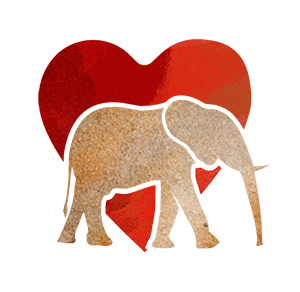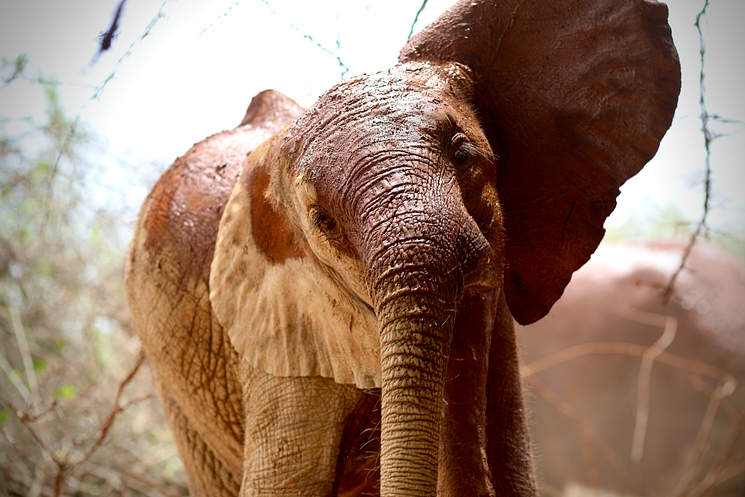Rokka’s rescue is more of an epic saga than a mere story. It all began on the evening of 26th July 2021, during a routine patrol along the Tiva River. Flying over a popular watering point, our pilots spotted a lone baby elephant. She was far too young to be on her own — seven months old, at most — and looked extremely stressed.
Using the baby as their epicentre, the pilots scoured a 15-kilometre radius area in search of other elephants. Occasionally, calves simply become separated from their families and a reunion is possible. However, they didn’t spot a single elephant. Clearly, this baby was an orphan.
It was getting late and the rescue window was closing with each passing minute. This is usually more than a two-man job, but the pilots were aware that if they didn’t act immediately, she would disappear forever in such a vast landscape. Calves are vulnerable enough as is, but this orphan was in a particularly dangerous predicament: She was surrounded by dense bush, which could swallow her up and make it impossible to locate her again.
The pilots knew that they would have to split up if they were going to rescue the orphan. Hamish briefly touched down, so Roan Carr-Hartley could leap to ground and track the calf on foot. This was a challenge, as he had to run more than a kilometre away from the riverbed through very thick bush, following the hovering helicopter’s lead. As soon as Roan had eyes on her, Hamish landed along the Tiva to remove the stressful presence of the aircraft.
Roan found the calf still full of fight. He had no tools at his disposal besides the very shirt on his back, so that’s exactly what he used. Removing his shirt, he ran up to her and covered her eyes, which is an effective rescue tactic to slow an orphan down. Despite her shroud, the calf took off through the undergrowth. Diving to grab her back legs, Roan was able to roll her on her side before she was lost to the bush forever.
Now, they were presented with another formidable challenge: How does one coax a frightened (and understandably uncooperative) calf through a kilometre’s worth of dense bush? Petrified with fear, she flatly refused to move into open ground. So, over the course of nearly two hours, Roan and Hamish painstakingly shepherded her towards the waiting helicopter. Given the late hour, the pair reformulated their plan. Hamish would fly back to Kaluku to pick up two Keepers and gather the proper supplies, while Roan remained in situ with the calf.
Once they got her within 800 metres of the nearest possible landing point, Roan captured the calf again and held her down. She didn’t make it easy, kicking and swivelling and putting up a great fight. Roan took the laces off his shoes and tried to restrain her, but they proved to be a poor replacement for proper elephant straps and promptly snapped. In the end, he had to lie on top of her to keep her from running off into the bush.
Knowing the ordeal would leave her dangerously dehydrated, Hamish had tossed down all the remaining water bottles in the helicopter before flying off. Between bottle-feeding her sips, Roan poured water behind her ears to keep her cool. With just a ground radio by his side, he spent a harrowing 90 minutes alone in the bush with a thrashing elephant, hoping all the while that the commotion didn’t attract Tsavo’s lions.
At 5 o’clock, Roan heard the welcome sound of the helicopter approaching. While Hamish searched for the nearest landing point, Keepers Kingoo and Joseph trekked through the bush, guided only by the sounds of Roan’s whistles. As soon as they found the pair, they fed the calf a bottle of rehydration and set about properly securing her. Now armed with elephant straps (which are a tool we will never take for granted!), they secured her legs and lifted her onto a customised rescue tarpaulin.
Dragging a hefty baby elephant is no small feat, even under the best of circumstances. Covering a distance of 800 meters, first through dense bush and then through sucking sand, is an undertaking on another level. By this point, it was 6 o’clock and everyone was absolutely exhausted. But they still had the final, crucial hurdle to overcome: lifting the calf up into the helicopter. After three unsuccessful attempts, they gathered their remaining strength for a last-ditch effort. Hamish, Kingoo, and Joseph raised the calf just off the ground, so Roan could slide underneath. Using his back as a hoisting platform, they finally lifted her into the helicopter. To everyone’s immense relief, the baby was finally onboard. They headed back to our Kaluku Neonate Nursery, just as the last rays of light sunk behind the horizon.
Much to the relief of the weary rescue team, a crew was waiting at the airstrip. They unloaded the calf and took her to her new bedroom, which was stocked with plenty of fresh greens and water. Lemeki and Thamana were a reassuring presence, easing her stress with their welcoming rumbles. The rescue team slept like babies that night!
We named the calf Rokka, a nod to the area where she was rescued along the Tiva River. She is an extremely spunky little girl, even now that she is fully settled in her new home. Despite the fact that she is one of the youngest members of our neonate herd, Rokka marches around with the bearing of an elephant twice her size. This determination undoubtedly helped her survive during her lonely time on the Tiva. Shortly after her rescue, the decayed carcasses of three poached elephants were discovered. It is very possible that one of them was Rokka’s mother.






























